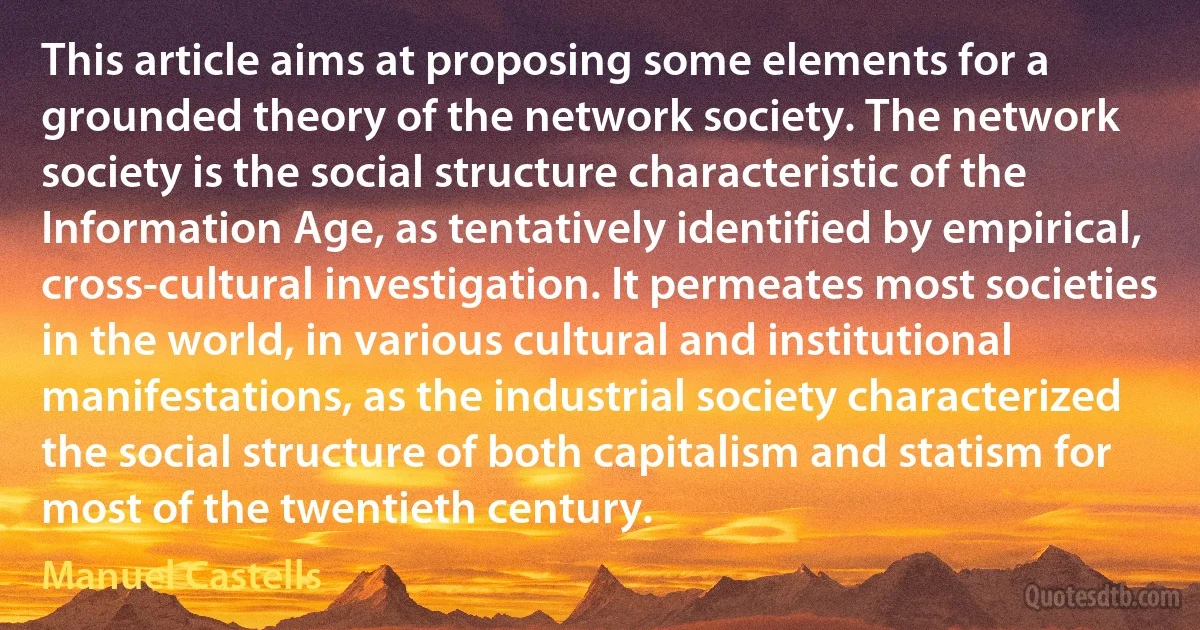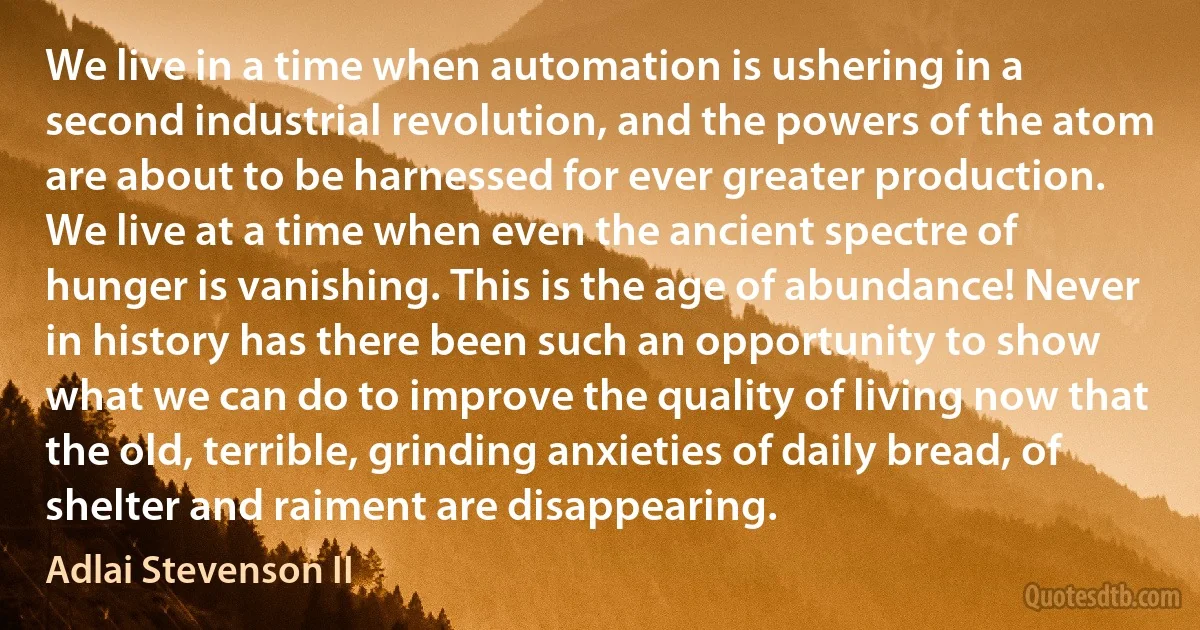Age Quotes - page 83
This volume explores the construction of collective identities as they relate to social movements and power struggles in the network society. It also deals with the transformation of the state, politics, and democracy under the conditions of globalization and new communication technologies. The understanding of these processes aims to provide new perspectives for the study of social change in the Information Age.

Manuel Castells
My main statement in that it does not really matter if you believe that this world, or any of its features, is new or not. My analysis stands by itself. This is our world, the world of the Information age. And this is my analysis of this world, which must be understood, used, judged, by itself, by its capacity, or incapacity, to identify and explain the phenomena that we observe and experience, regardless of its newness.

Manuel Castells
The 20th century, with its scores of millions of supernumerary dead, has been called the age of ideology. And the age of ideology, clearly, was a mere hiatus in the age of religion, which shows no sign of expiry. Since it is no longer permissible to disparage any single faith or creed, let us start disparaging all of them. To be clear: an ideology is a belief system with an inadequate basis in reality; a religion is a belief system with no basis in reality whatever. Religious belief is without reason and without dignity, and its record is near-universally dreadful. It is straightforward - and never mind, for now, about plagues and famines: if God existed, and if He cared for humankind, He would never have given us religion.

Martin Amis
No generation can choose the age or circumstance in which it is born, but through leadership it can choose to make the age in which it is born an age of enlightenment, an age of jobs, and peace, and justice. Only leadership -- that intangible combination of gifts, the discipline, information, circumstance, courage, timing, will and divine inspiration -- can lead us out of the crisis in which we find ourselves. Leadership can mitigate the misery of our nation. Leadership can part the waters and lead our nation in the direction of the Promised Land. Leadership can lift the boats stuck at the bottom.

Jesse Jackson
Don't look for me to make a run for the White House. I don't want that. I see what happens to everyone who takes that office: They all go in so virile and young, and then in the course of 4 years they age 20. I can get by being governor, but being president would be too much stress, too much responsibility - I'd be the most powerful person in the world! And I don't want to do that to Terry. I won't say absolutely not, but I wouldn't put any money on there ever being a Jesse "The Prez" Ventura.

Jesse Ventura
The best chance disabled students have for productive adult lives comes from being mainstreamed among other students. My daughter Jade is living proof of that. She has a disability, but we have made sure that she has gotten the same kind of exposure as other kids her age. There are a few exceptions; there are students whose special needs are such that mainstreaming won't work for them. But in the majority of cases, mainstreaming should be supported, encouraged, and facilitated for disabled students.

Jesse Ventura
The great aristocrat, the beloved leader, the profound historian, the gifted painter, the superb politician, the lord of language, the orator, the wit-yes, and the dedicated bricklayer-behind all of them was a simple man of faith, steadfast in defeat, generous in victory, resigned in age, trusting in a loving providence, and committing his achievements and his triumphs to a higher power.

Adlai Stevenson II
We have entered an age of insecurity-economic insecurity, physical insecurity, political insecurity. The fact that we are largely unaware of this is small comfort: few in 1914 predicted the utter collapse of their world and the economic and political catastrophes that followed. Insecurity breeds fear. And fear-fear of change, fear of decline, fear of strangers and an unfamiliar world-is corroding the trust and interdependence on which civil societies rest.

Tony Judt
The case for reviving the state does not rest uniquely upon its contributions to modern society as a collective project; there is a more urgent consideration. We have entered an age of fear. Insecurity is once again an active ingredient of political life in Western democracies. Insecurity born of terrorism, of course; but also, and more insidiously, fear of the uncontrollable speed of change, fear of the loss of employment, fear of losing ground to others in an increasingly unequal distribution of resources, fear of losing control of the circumstances and routines of our daily life. And, perhaps above all, fear that it is not just we who can no longer shape our lives but that those in authority have also lost control, to forces beyond their reach.

Tony Judt
This book is about three Frenchmen who lived and wrote against the grain of these three ages of irresponsibility. They were very different men and would have been surprised to think of themselves as a group, yet they have something rather distinctive in common. All three played an important role in the France of their lifetime but lived at a slightly awkward tangent to their contemporaries. For much of his adult life each was an object of dislike, suspicion, contempt, or hatred for many of his peers and contemporaries; only at the end of their long lives were Léon Blum and Raymond Aron, for quite different reasons, able to relax into the comfort of near-universal admiration, respect, and, in some quarters, adulation. Camus, who had experienced all three by the age of thirty-five, died twelve years later an insecure and much-maligned figure; it would be thirty years before his reputation would recover.

Tony Judt



